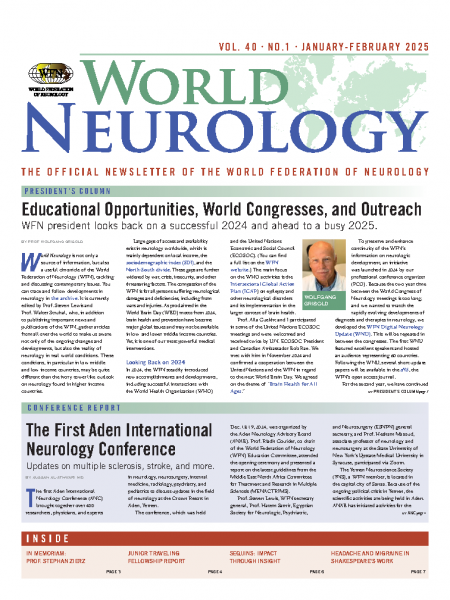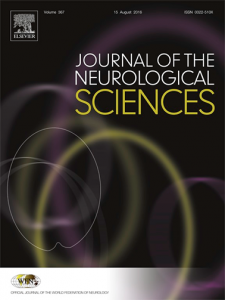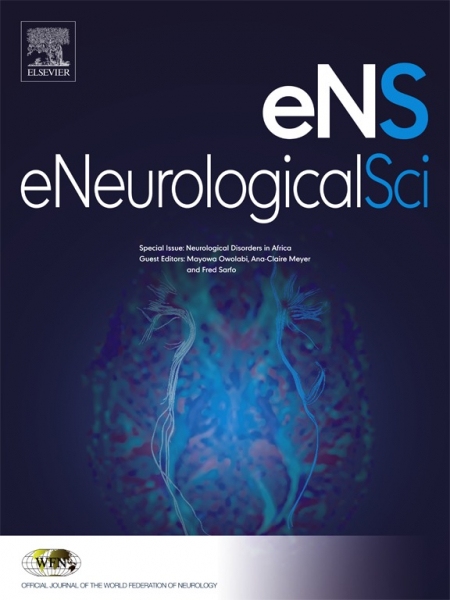|

-
By Aussan Al-Athwari, MD
The first Aden International Neurology Conference (ANC) brought together over 400 researchers, physicians, and experts in neurology, neurosurgery, internal medicine, radiology, psychiatry, and pediatrics to discuss updates in the field of neurology at the Crown Resort in Aden, Yemen.
The conference, which was held Dec. 18-19, 2024, was organized by the Aden Neurology Advisory Board (ANAB). Prof. Riadh Gouider, co-chair of the World Federation of Neurology (WFN) Education Committee, attended the opening ceremony and presented a report on the latest guidelines from the Middle East North Africa Committee for Treatment and Research in Multiple Sclerosis (MENACTRIMS)...
-
By Peter J. Koehler
English playwright and poet William Shakespeare (1564-1616, see Figure 1) was born in Stratford-upon-Avon and is known as the "Bard of Avon." He wrote a vast body of work that includes no fewer than 39 plays and 154 sonnets. He married 26-year-old Anne Hathaway (1556-1623) in 1582, when he was 18 years old. They had three children, of whom the oldest, Susanna (1583-1649) married a local physician named John Hall (1575-1635). Hall studied at Queen's College Cambridge (BA 1593, MA 1597). However, he had no English medical degree and probably received medical training on the continent. This was possibly in France, as he was "a traveler acquainted with the French tongue."
Open latest issue
|

-
Zhou R, Sangam K, Cabrera A, AlMutawa F, Sivro A, Roy F, Silverman M, Sharma M, Budhram A.
Journal of the Neurological Sciences. 2025 Jan 3:123379.
To determine the positive predictive value (PPV) of CSF John Cunningham virus (JCV) quantitative PCR (qPCR) for progressive multifocal leukoencephalopathy (PML), and highlight neuroimaging findings reported to be suggestive of this disease.
We reviewed patients at London Health Sciences Centre with a positive CSF JCV qPCR result. Patients were classified as true-positive if they had a clinico-radiographic presentation compatible with PML and no more likely alternative diagnosis. The presence of suggestive neuroimaging findings was documented as supportive evidence of PML. The PPV of CSF JCV qPCR was calculated as the proportion of positive results that were classified as true-positives.
-
Magiel E, Kozlov Y, Goldberg T, Dagan RL, Watad A, Gendelman O, Anis S.
Journal of the Neurological Sciences. 2024 Dec 30:123374.
Patients with connective tissue diseases (CTD) can have a wide range of neurological manifestations. Neurological complaints may be the presenting symptom of CTD. Therefore, screening for CTD using anti-nuclear antibodies (ANA) is a common practice. However, due to the abundance of positive ANA in a healthy population, interpretation of the results may be complex.
We retrospectively evaluated files of patients hospitalized for evaluation of neurological symptoms in Sheba Medical Center during the years 2007–2022. Data was collected regarding epidemiology, ANA status, and rheumatological diagnosis.
Open latest issue
|

OPEN ACCESS JOURNAL
-
Grisold W, Lewis SL.
eNeurologicalSci. 2025 Jan 5;38:100548
Congresses remain the main source of scientific meetings, combining science and education as well as personal interactions. Congresses are slowly returning to in-person meetings; however, some organizations, such as the World Federation of Neurology (WFN), adhere to the hybrid concept, both virtual and in-person.
To do this, we host the WFN World Congresses of Neurology (WCN), which reports the latest achievements and will remain hybrid (https://wcn-neurology.com); however, we think that two years between congresses is too long. For this reason, we introduced the World Federation of Neurology Digital Neurology Update (WNU)
-
Crivelli L, Winkler A, Keller G, Beretta S, Calandri I, De Groote W, Fornari A, Frontera J, Kivipelto M, Lopez-Rocha AS, Mangialasche F.
eNeurologicalSci. 2024 Nov 21:100539
This systematic review analyzes the impact of COVID-19 on dementia patients' functional, cognitive, neuropsychiatric, and health related outcomes. It hypothesizes that dementia patients infected with SARS-CoV-2experience more pronounced deterioration compared to those who are uninfected.
Among 198 studies reviewed, only three met the criteria. Chen et al. (2023) identified higher mortality in SARS-CoV-2-infected dementia patients, while Merla et al. (2023) observed faster cognitive decline in infected individuals with increased hospital admissions. Additionally, Cascini et al. (2022) reported an increased risk of infection and significantly elevated mortality in dementia patients, highlighting comorbidities and antipsychotic medication use as key risk factors.
-
Rocca WA.
eNeurologicalSci. 2024 Dec 3:100544.
The practice of modern neurology is based on research evidence. Research evidence is constructed by teams of investigators throughout the world, from Tokyo to Buenos Aires, from Sidney to Vancouver, from New York to Rome. These investigators use research methods and tools to design and conduct their studies. Neuroepidemiology is the science used to conduct clinical studies and population studies and to construct medical research evidence. Thus, neuroepidemiology is the architecture of medical research evidence. In particular, epidemiologic methods are used to describe the frequency and distribution of neurological diseases in human populations, to discover risk and protective factors, to study outcomes of diseases, and to measure the response to treatments.
Open latest issue
|